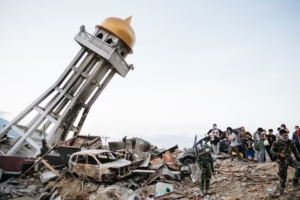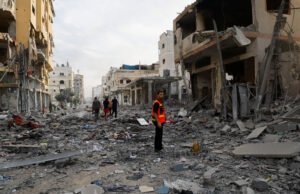Covid-19: Scientists share experiences, expertise in Islamic countries at first international meeting
Al-Mustafa Foundation for Science and Technology, in partnership with in the Science, Technology and Studies Organization of Singapore has organized the first international meeting to discuss solutions to Covid-19.
The virtual meeting which was held on Tuesday May 19, 2020, was attended by 23 international organizations and universities.
The participants exchanged experiences and scientific expertise in Islamic countries.
The participants included the World Health Organization, the Permanent Committee for Scientific and Technological Cooperation of the Organization of the Islamic Conference, the Academy of Global Sciences and the Association for the Advancement of Science and Technology in the Arab World.
The session, which discussed methods, obstacles and proposed solutions to overcome the pandemic of the era, revolves around “scientific and technological cooperation in order to overcome the challenge of the Corona virus”.
Malaysian Professor, Drianu Hadi Jahejano, Dean of the College of Pharmacy at Bandung Institute of Technology in Malaysia, commended the Al-Mustafa Foundation for coming up with an initiative to tackle the current conditions resulting from the outbreak of corona.
She also expressed delight over the opportunity to hold the meeting online in total compliance with with the social distancing.
The Malaysian Professor stressed the importance of the cooperation of different public and private sectors in facing the challenge of Corona and the extent of their support in the Malaysian experience in facing Corona.
“All sectors including universities, NGOs, pharmaceutical companies, individuals and legal entities as well as various companies and the health care system, have helped educate people Treat patients and support the injured,” she said.
Also at the meeting, Dr. Iraj Hariri, Iranian Deputy Minister of Health, explained the measures that were taken in the face of Corona.
He stated that the measures began with the formation of the National Committee to confront Corona, and then the Ministry of Health took precautionary measures and treatment protocols that have been fully implemented.
“We have obtained Good results through following the mechanisms of diagnosis, preventive investigation and investigation, as it led to a decrease in the number of injuries and deaths. Friendly as much as possible,” he said.
Iranian Professor, Abdul Majeed Jaragali, Dean of the College of Pharmacy at the University of Rest of God for Medical Sciences, explained the way to treat corona patients using blood plasma for people who have been cured, considering it the most effective way at the present time to treat corona patients.
He stated that the virus posed a global challenge to humanity, and due to the absence of a specific drug for its treatment, medical staff were busy searching for a cure and vaccine for this virus.
He explained further that all scientists did their best to find the best treatment, and used the blood plasma of people who recovered as one of the options they adopted with treatment, pointing out that the factor more important in plasma therapy is its use in the early stages of the disease which leads to positive results.
While explaining the dangers of the Corona virus to cancer patients,
Malaysian Professor, Shirina Muhammad Siddiq, Professor of Cancer Research Center at the Malaysian University of Putra, noted that people with cancer who receive chemotherapy are the most vulnerable people if they are infected with the Corona virus, compared to ordinary people who do not suffer from Health problems.
He added that there are problems regarding providing medicines for people with malignant diseases, stressing that if cancer patients are not able to take their medication and doses regularly, this will lead to serious complications for them that cannot be sustained.
Professor Waseem Jafri, Professor of Gastroenterology at the Aga Khan University of Pakistan explained that early diagnosis is very important in the treatment of corona patients as well as basic medical interventions such as oxygen therapy and medications.
“The percentage of Covid patients 19 in the world, especially the difficult cases that cause an imbalance in the work of the liver, is relatively few, indicating that, according to clinical studies, 2 to 11 percent of people with Coronavirus face a type of disease,” he said.
“Each in the liver, explaining that with regard to children, they usually suffer from mild symptoms, while pregnant women do not have severe clinical symptoms compared to their peers,” he noted.
“A 14-day quarantine for people who have been in contact with patients is a good way to prevent the virus from spreading,” he adde.
Professor Farid Al-Alam, professor at Dhaka University of Medical Sciences in Bangladesh, pointed out the challenges that Bangladesh faces due to the Coron pandemic.
“One of the challenges we face is the low budget for the health sector. Another problem is the shortage of doctors and nurses in public hospitals in Bangladesh.
“There is also a shortage of devices ventilation, which numbered only 1769 devices in the country,” he said.
He also stressed that despite these problems, the Bangladesh government has prepared and presented various guidelines and strategies for institutions, organizations and people to prevent the spread of the disease.
He added that a team of Bangladeshi scientists is working to develop an appropriate drug for the disease.
Professor Jian Kang Ju, CEO of Jiang Shan Chen Hospital, explained that people suffering from other disorders in other parts of their body are treated in other hospitals, and about a fifth of foreign patients may suffer from chronic respiratory failure.
“The Chinese government has prepared a plan to anticipate the patient’s condition where Patients with other disorders also have more serious problems, while no drug has yet been able to kill this virus,” he stated.
Professor Rostom Rostomov, a professor at the University of Khazar in the Republic of Azerbaijan, emphasized the role of information technology in the fight against coronavirus.
According to him, information technology has played an important role in preventing disease outbreaks, such as traffic control and access to student education and providing health education services to people, friends and families.
He added that the geographic information system also plays an important role in epidemiological information management based on satellite technology and gives governments a greater picture of the general condition of the disease.
“It also determines the number and movement of patients in certain regions because the spread of the Corona virus is a global problem that needs global treatment, as general and comprehensive measures, coordinated technological equipment and the exchange of data and experiences between countries facilitate the finding of a solution to this dilemma,” he explained.







